| Folk-customs in Jinzhou |
|
|

Spring Festival
The Spring Festival is the most important festival for the Chinese people and is when all family members get together, just like Christmas in the West. All people living away from home go back, becoming the busiest time for transportation systems of about half a month from the Spring Festival. Airports, railway stations and long-distance bus stations are crowded with home returnees.
The Spring Festival falls on the 1st day of the 1st lunar month, often one month later than the Gregorian calendar. It originated in the Shang Dynasty (c. 1600 BC-c. 1100 BC) from the people's sacrifice to gods and ancestors at the end of an old year and the beginning of a new one.
Strictly speaking, the Spring Festival starts every year in the early days of the 12th lunar month and will last till the mid 1st lunar month of the next year. Of them, the most important days are Spring Festival Eve and the first three days. The Chinese government now stipulates people have seven days off for the Chinese Lunar New Year.
Many customs accompany the Spring Festival. Some are still followed today, but others have weakened.
On the 8th day of the 12th lunar month, many families make laba porridge, a delicious kind of porridge made with glutinous rice, millet, seeds of Job's tears, jujube berries, lotus seeds, beans, longan and gingko.
The 23rd day of the 12th lunar month is called Preliminary Eve. At this time, people offer sacrifice to the kitchen god. Now however, most families make delicious food to enjoy themselves.
After the Preliminary Eve, people begin preparing for the coming New Year. This is called "Seeing the New Year in".
Store owners are busy then as everybody goes out to purchase necessities for the New Year. Materials not only include edible oil, rice, flour, chicken, duck, fish and meat, but also fruit, candies and kinds of nuts. What's more, various decorations, new clothes and shoes for the children as well as gifts for the elderly, friends and relatives, are all on the list of purchasing.
Before the New Year comes, the people completely clean the indoors and outdoors of their homes as well as their clothes, bedclothes and all their utensils.
Then people begin decorating their clean rooms featuring an atmosphere of rejoicing and festivity. All the door panels will be pasted with Spring Festival couplets, highlighting Chinese calligraphy with black characters on red paper. The content varies from house owners' wishes for a bright future to good luck for the New Year. Also, pictures of the god of doors and wealth will be posted on front doors to ward off evil spirits and welcome peace and abundance.
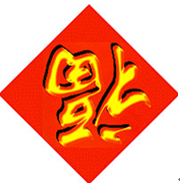
The Chinese character "fu" (meaning blessing or happiness) is a must. The character put on paper can be pasted normally or upside down, for in Chinese the "reversed fu" is homophonic with "fu comes", both being pronounced as "fudaole." What's more, two big red lanterns can be raised on both sides of the front door. Red paper-cuttings can be seen on window glass and brightly colored New Year paintings with auspicious meanings may be put on the wall.
People attach great importance to Spring Festival Eve. At that time, all family members eat dinner together. The meal is more luxurious than usual. Dishes such as chicken, fish and bean curd cannot be excluded, for in Chinese, their pronunciations, respectively "ji", "yu" and "doufu," mean auspiciousness, abundance and richness. After the dinner, the whole family will sit together, chatting and watching TV. In recent years, the Spring Festival party broadcast on China Central Television Station (CCTV) is essential entertainment for the Chinese both at home and abroad. According to custom, each family will stay up to see the New Year in.
Waking up on New Year, everybody dresses up. First they extend greetings to their parents. Then each child will get money as a New Year gift, wrapped up in red paper. People in northern China will eat jiaozi, or dumplings, for breakfast, as they think "jiaozi" in sound means "bidding farewell to the old and ushering in the new". Also, the shape of the dumpling is like gold ingot from ancient China. So people eat them and wish for money and treasure.
Southern Chinese eat niangao (New Year cake made of glutinous rice flour) on this occasion, because as a homophone, niangao means "higher and higher, one year after another." The first five days after the Spring Festival are a good time for relatives, friends, and classmates as well as colleagues to exchange greetings, gifts and chat leisurely.

Burning fireworks was once the most typical custom on the Spring Festival. People thought the spluttering sound could help drive away evil spirits. However, such an activity was completely or partially forbidden in big cities once the government took security, noise and pollution factors into consideration. As a replacement, some buy tapes with firecracker sounds to listen to, some break little balloons to get the sound too, while others buy firecracker handicrafts to hang in the living room.
The lively atmosphere not only fills every household, but permeates to streets and lanes. A series of activities such as lion dancing, dragon lantern dancing, lantern festivals and temple fairs will be held for days. The Spring Festival then comes to an end when the Lantern Festival is finished.
China has 56 ethnic groups. Minorities celebrate their Spring Festival almost the same day as the Han people, and they have different customs
Lantern Festival
The Lantern Festival falls on the 15th day of the 1st lunar month, usually in February or March in the Gregorian calendar. As early as the Western Han Dynasty (206 BC-AD 25), it had become a festival with great significance.
This day's important activity is watching lanterns. Throughout the Han Dynasty (206 BC-AD 220), Buddhism flourished in China. One emperor heard that Buddhist monks would watch sarira, or remains from the cremation of Buddha's body, and light lanterns to worship Buddha on the 15th day of the 1st lunar month, so he ordered to light lanterns in the imperial palace and temples to show respect to Buddha on this day. Later, the Buddhist rite developed into a grand festival among common people and its influence expanded from the Central Plains to the whole of China.
Till today, the lantern festival is still held each year around the country. Lanterns of various shapes and sizes are hung in the streets, attracting countless visitors. Children will hold self-made or bought lanterns to stroll with on the streets, extremely excited.
"Guessing lantern riddles"is an essential part of the Festival. Lantern owners write riddles on a piece of paper and post them on the lanterns. If visitors have solutions to the riddles, they can pull the paper out and go to the lantern owners to check their answer. If they are right, they will get a little gift. The activity emerged during people's enjoyment of lanterns in the Song Dynasty (960-1279). As riddle guessing is interesting and full of wisdom, it has become popular among all social strata.

People will eat yuanxiao, or rice dumplings, on this day, so it is also called the "Yuanxiao Festival."Yuanxiao also has another name, tangyuan. It is small dumpling balls made of glutinous rice flour with rose petals, sesame, bean paste, jujube paste, walnut meat, dried fruit, sugar and edible oil as filling. Tangyuan can be boiled, fried or steamed. It tastes sweet and delicious. What's more, tangyuan in Chinese has a similar pronunciation with "tuanyuan”, meaning reunion. So people eat them to denote union, harmony and happiness for the family.
In the daytime of the Festival, performances such as a dragon lantern dance, a lion dance, a land boat dance, a yangge dance, walking on stilts and beating drums while dancing will be staged. On the night, except for magnificent lanterns, fireworks form a beautiful scene. Most families spare some fireworks from the Spring Festival and let them off in the Lantern Festival. Some local governments will even organize a fireworks party. On the night when the first full moon enters the New Year, people become really intoxicated by the imposing fireworks and bright moon in the sky.
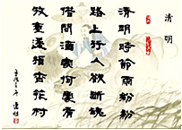 Qingming Festival Qingming Festival
The Qingming (Pure Brightness) Festival is one of the 24 seasonal division points in China, falling on April 4-6 each year. After the festival, the temperature will rise up and rainfall increases. It is the high time for spring plowing and sowing. But the Qingming Festival is not only a seasonal point to guide farm work, it is more a festival of commemoration.
The Qingming Festival sees a combination of sadness and happiness.
This is the most important day of sacrifice. Both the Han and minority ethnic groups at this time offer sacrifices to their ancestors and sweep the tombs of the diseased. Also, they will not cook on this day and only cold food is served.
The Hanshi (Cold Food) Festival was usually one day before the Qingming Festival. As our ancestors often extended the day to the Qingming, they were later combined.

On each Qingming Festival, all cemeteries are crowded with people who came to sweep tombs and offer sacrifices. Traffic on the way to the cemeteries becomes extremely jammed. The customs have been greatly simplified today. After slightly sweeping the tombs, people offer food, flowers and favorites of the dead, then burn incense and paper money and bow before the memorial tablet.
In contrast to the sadness of the tomb sweepers, people also enjoy hope of Spring on this day. The Qingming Festival is a time when the sun shines brightly, the trees and grass become green and nature is again lively. Since ancient times, people have followed the custom of Spring outings. At this time tourists are everywhere.
People love to fly kites during the Qingming Festival. Kite flying is actually not limited to the Qingming Festival. Its uniqueness lies in that people fly kites not during the day, but also at night. A string of little lanterns tied onto the kite or the thread look like shining stars, and therefore, are called "god's lanterns."
The Qingming Festival is also a time to plant trees, for the survival rate of saplings is high and trees grow fast later. In the past, the Qingming Festival was called "Arbor Day". But since 1979, "Arbor Day" was settled as March 12 according to the Gregorian calendar.
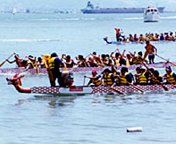
Dragon Boat Festival
The Dragon Boat Festival, the 5th day of the 5th lunar month, has had a history of more than 2,000 years. It is usually in June in the Gregorian calendar.
There are many legends about the evolution of the festival, the most popular of which is in commemoration of Qu Yuan (340-278 BC). Qu Yuan was minister of the State of Chu and one of China's earliest poets. In face of great pressure from the powerful Qin State, he advocated enriching the country and strengthening its military forces so as to fight against the Qin. However, he was opposed by aristocrats headed by Zi Lan, and later deposed and exiled by King Huai. In his exiled days, he still cared much for his country and people and composed immortal poems including Li Sao (The Lament), Tian Wen (Heavenly Questions) and Jiu Ge (Nine Songs), which had far-reaching influences. In 278 BC, he heard the news that Qin troops had finally conquered Chu's capital, so he finished his last piece Huai Sha (Embracing Sand) and plunged himself into the Miluo River, clasping his arms to a large stone. The day happened to be the 5th of the 5th month in the Chinese lunar calendar. After his death, the people of Chu crowded to the bank of the river to pay their respects to him. The fishermen sailed their boats up and down the river to look for his body. People threw into the water zongzi (pyramid-shaped glutinous rice dumplings wrapped in reed or bamboo leaves) and eggs to divert possible fish or shrimp from attacking his body. An old doctor poured a jug of reaglar wine (Chinese liquor seasoned with realgar) into the water, hoping to turn all aquatic beasts drunk. That's why people later followed the customs such as dragon boat racing, eating zongzi and drinking realgar wine on that day.
Dragon boat racing is an indispensable part of the festival, held all over the country. As the gun is fired, people will see racers in dragon-shaped canoes pulling the oars harmoniously and hurriedly, accompanied by rapid drums, speeding toward their destination. Folk tales say the game originates from the activities of seeking Qu Yuan's body, but experts, after painstaking and meticulous research, conclude that dragon boat racing is a semi-religious, semi-entertaining program from the Warring States Period (475-221 BC). In the following thousands of years, the game spread to Japan, Vietnam and Britain as well as China's Taiwan and Hong Kong. Now dragon boat racing has developed into an aquatic sports item which features both Chinese tradition and modern sporting spirit. In 1980, it was listed into the state sports competition programs and has since been held every year. The award is called "Qu Yuan Cup."
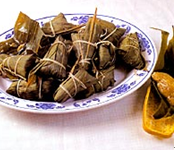
Zongzi is an essential food of the Dragon Boat Festival. It is said that people ate them in the Spring and Autumn Period (770-476 BC). In early times, it was only glutinous rice dumplings wrapped in reed or other plant leaves and tied with colored thread, but now the fillings are more diversified, including jujube and bean paste, fresh meat, and ham and egg yolk. If time permits, people will soak glutinous rice, wash reed leaves and wrap up zongzi themselves. Otherwise, they will go to shops to buy whatever stuff they want. The custom of eating zongzi is now popular in North and South Korea, Japan and Southeast Asian nations.
On Dragon Boat Festival, parents also need to dress their children up with a perfume pouch. They first sew little bags with colorful silk cloth, then fill the bags with perfumes or herbal medicines, and finally string them with silk threads. The perfume pouch will be hung around the neck or tied to the front of a garment as an ornament. They are said to be able to ward off evil.
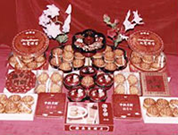
Mid-Autumn Festival
The Mid-Autumn Festival falls on the 15th day of the 8th lunar month, usually in October in Gregorian calendar.
The festival has a long history. In ancient China, emperors followed the rite of offering sacrifices to the sun in spring and to the moon in autumn. Historical books of the Zhou Dynasty had had the word "Mid-Autumn". Later aristocrats and literary figures helped expand the ceremony to common people. They enjoyed the full, bright moon on that day, worshipped it and expressed their thoughts and feelings under it. By the Tang Dynasty (618-907), the Mid-Autumn Festival had been fixed, which became even grander in the Song Dynasty (960-1279). In the Ming (1368-1644) and Qing (1644-1911) dynasties, it grew to be a major festival of China.
Folklore about the origin of the festival go like this: In remote antiquity, there were ten suns rising in the sky, which scorched all crops and drove people into dire poverty. A hero named Hou Yi was much worried about this, he ascended to the top of the Kunlun Mountain and, directing his superhuman strength to full extent, drew his extraordinary bow and shot down the nine superfluous suns one after another. He also ordered the last sun to rise and set according to time. For this reason, he was respected and loved by the people and lots of people of ideals and integrity came to him to learn martial arts from him. A person named Peng Meng lurked in them.
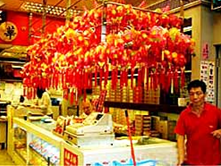
Hou Yi had a beautiful and kindhearted wife named Chang E. One day on his way to the Kunlun Mountain to call on friends, he ran upon the Empress of Heaven Wangmu who was passing by. Empress Wangmu presented to him a parcel of elixir, by taking which, it was said, one would ascend immediately to heaven and become a celestial being. Hou Yi, however, hated to part with his wife. So he gave the elixir to Chang E to treasure for the time being. Chang E hid the parcel in a treasure box at her dressing table when, unexpectedly, it was seen by Peng Meng.
One day when Hou Yi led his disciples to go hunting, Peng Meng, sword in hand, rushed into the inner chamber and forced Chang E to hand over the elixir. Aware that she was unable to defeat Peng Meng, Chang E made a prompt decision at that critical moment. She turned round to open her treasure box, took up the elixir and swallowed it in one gulp. As soon as she swallowed the elixir her body floated off the ground, dashed out of the window and flew towards heaven. Peng Meng escaped.
When Hou Yi returned home at dark, he knew from the maidservants what had happened. Overcome with grief, Hou Yi looked up into the night sky and called out the name of his beloved wife when, to his surprise, he found that the moon was especially clear and bight and on it there was a swaying shadow that was exactly like his wife. He tried his best to chase after the moon. But as he ran, the moon retreated; as he withdrew, the moon came back. He could not get to the moon at all.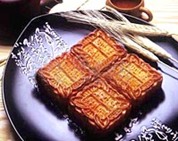
Thinking of his wife day and night, Hou Yi then had an incense table arranged in the back garden that Chang E loved. Putting on the table sweetmeats and fresh fruits Chang E enjoyed most, Hou Yi held at a distance a memorial ceremony for Chang E who was sentimentally attached to him in the palace of the moon.
When people heard of the story that Chang E had turned into a celestial being, they arranged the incense table in the moonlight one after another and prayed kindhearted Chang E for good fortune and peace. From then on the custom of worshiping the moon spread among the people.
People in different places follow various customs, but all show their love and longing for a better life. Today people will enjoy the full moon and eat moon cakes on that day. |
|
| |















